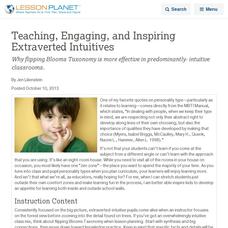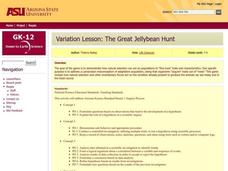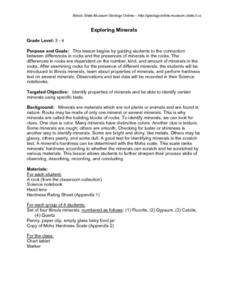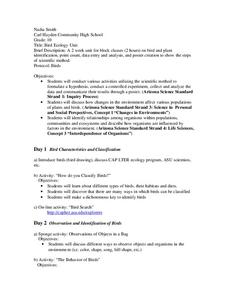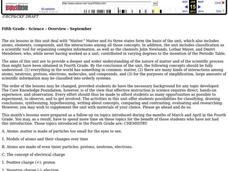Curated OER
Teaching, Engaging, and Inspiring Extraverted Intuitives
Why flipping Blooms Taxonomy is more effective in predominantly- intuitive classrooms.
University of North Carolina
Psychology
Psychology, the scientific study of the human mind and behavior, is a popular major for many college students. An informative handout outlines common assignments in psychology courses. Scholars see how to design a research proposal,...
Virginia Department of Education
Photosynthesis and Cellular Respiration
Provide high schoolers with their own indoor gardens! Emerging scientists discuss the process of photosynthesis and germinate seeds before growing plants in multiple lighting conditions. The hands-on application allows pupils to see...
National History Day
Helping Life and Aiding Death: Science, Technology, and Engineering at Work during World War I
Science, engineering, and United States history? Pupils research collections of artifacts from the Smithsonian to learn about historical scientific innovations. At the end of the lesson, they write an essay to discuss technology's...
Curated OER
Chalkboard Challenge
Here's a terrific Jeopardy-style game that's designed for 3rd and 4th grade students of science. The topics include living things, animals, plants, matter, and "hodge-podge." The questions are all age appropriate, and there is an...
Curated OER
Scientific Processes Word Search Puzzle
In this science worksheet, students look for the words that are part of the word search puzzle that is focused around the theme of the sheet.
Ocean Explorer
Easy as Pi
Seamounts are large, extinct volcanoes that rise up from the bottom of the ocean floor. They are a relatively new landform in the scientific community, and this lesson invites young scholars to learn about the amazing diversity of life...
Curated OER
The Great Jellybean Hunt
Students explore natural selection and its influence on the populations to fine tune traits and characteristics. The acquisition of traits developed out of need is examined through a game played in class.
Curated OER
Investigating Evolutionary Questions: Bats, Whales, Reptiles, Birds, Animal Classification
Students are guided through a process in which three questions are addressed by retrieving beta hemoglobin sequences from online databases, and using online tools to compare those sequences in student-selected animals.
Curated OER
What Is a Species?
Students are able to recognize that scientists use different definitions of species. They are able to assess the strengths and limitations of species definitions depending on their context. Students are able to use definitions of...
Curated OER
Flightless Birds and Scientific Research
Students study the work done by various scientists on Antarctica. In this biology lesson, students play the role of researchers who must justify the importance of their study. They create a multimedia presentation about a specific issue...
Curated OER
Exploring Minerals
I love this geology lesson plan. Third and fourth graders look at the connections, and the differences, between rocks and minerals. Learners are charged with identifying specific rocks and minerals, learning how to properly use...
Curated OER
What's Really True? Discovering the Fact and Fiction of Autism
Youngsters investigate autism and autism spectrum disorders. They access a variety of websites which present information on ASD's, and assess how accurate the information they've read actually is. They work in groups and utilize...
Texas State Energy Conservation Office
Investigation: Conservation of Energy
By rolling marbles down a six-foot length of track, physical scientists determine how much energy is lost to heat. It is recommended that you opt for the foam pipe insulation track because more friction slows the marble, allowing...
Virginia Department of Education
Charles’ Law
Searching for a relatively interesting way to demonstrate Charles' Law? Here is a instructional activity in which pupils heat air inside a flask and then cool the flask to quickly cool the air. They make observations about what occurs...
Towson University
Looking Into Lactase: Guided Inquiry
Milk does a body good ... unless, of course, someone is lactose intolerant. Pupils play the role of pharmaceutical scientists in a guided inquiry lab about lactase. Lab groups collaborate to learn more about lactose intolerance, how...
Texas State University
Earth: Deposition and Lithification
Geology geniuses analyze sediment samples with a hand lens and sort according to physical characteristics. They also learn about the processes of cementation, compaction, and lithification within the rock cycle. The lesson plan is...
Discovery Education
Future Fleet
Turn your pupils into engineers who are able to use scientific principals to design a ship. This long-term project expects pupils to understand concepts of density, buoyancy, displacement, and metacenter, and apply them to constructing a...
Curated OER
Bird Ecology Unit
Tenth graders conduct various activities utilizing the scientific method to formulate a hypothesis, conduct a controlled experiment, collect and analyze the data and communicate their results through a poster. They also identify...
NASA
Measuring Dark Energy
You're only 10 minutes late? Do you know how much the universe has expanded in those 10 minutes? Scholars graph supernovae based on their redshift and see if the results verify Hubble's Law. If it does confirm it, the universe is...
Curated OER
Rock-A-Bye Pendulum
Third graders use the scientific process to explore the effects of force on an object in motion. They demonstrate that the greater the force applied to an object, the greater the change in speed or direction of the object. They...
Curated OER
Matter
Fifth graders investigate the nature of matter and of the scientific processes associated with them in this series of lessons.
Curated OER
The Urban Heat Island Effect - Lesson 2 (Grades 8-9)
Students use the scientific process to show that when various surfaces are exposed to similar environmental conditions, surface temperatures may vary. They examine the "urban heat island" phenomenon and analyze why it increases energy...
PBS
The Chrysalis or Pupa
What is one of the most exciting parts of a butterfly's life cycle? When it emerges from its pupa and dries its wings! This is a great activity little ones will love. They discuss what happens during the pupal stage of the butterfly life...


